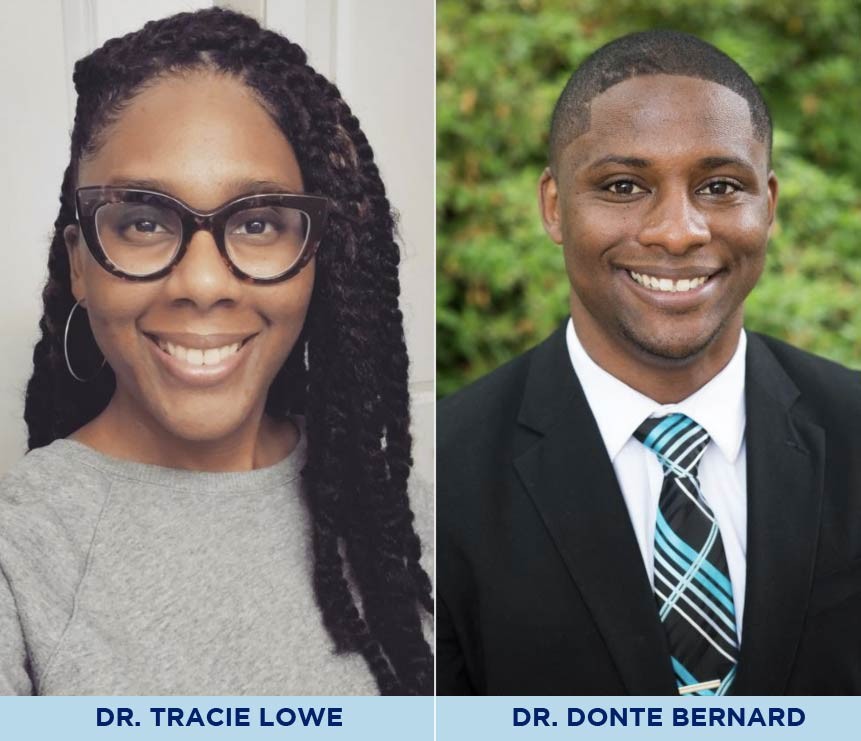Finding your voice in spaces you don’t see yourself
Self-awareness and open dialogue on an institutional level can help alleviate the effects of impostor syndrome.

In the third episode of the Invisible and On Stage podcast, psychologist and host Dr. Keoshia Worthy and guests Dr. Donte Bernard (Medical University of South Carolina) and Dr. Tracie Lowe (University of Texas at Austin) engage in thought-provoking dialogue about their research and lived experiences with impostor syndrome and discuss how to find their authentic voice in the varied spaces they find themselves in.
In the episode’s opener, Dr. Worthy kicks off the conversation on impostor syndrome with a story about Michelle Obama: as she was on her book tour, the former First Lady shared how she continues to struggle with impostor syndrome. It was a surprise to many as there is a common misconception that successful people don’t have impostor syndrome.
“I think one thing that I really resonate here with is this idea of finding your voice. But I think even more than that, not only finding your voice, but valuing the voice that you have in these spaces.”
Various roots of impostorism
In the workplace and larger-scale institutions, impostor syndrome can be reinforced and perpetuated simply through lack of representation, say Drs. Bernard and Lowe. When employees aren’t represented in their workplace, such environments can create an atmosphere filled with feelings of inadequacy and failure. Black women in particular are especially susceptible to these feelings of inadequacy due to not seeing themselves in these spaces.
At the root of impostor syndrome is one’s feeling of being a fraud. Oftentimes impostor syndrome can materialize when one joins a new environment and measures themselves to those around them. This causes one to see themselves as “the only,” thus not belonging, and ultimately a fraud. Dr. Lowe contrasted two different experiences she had with impostor syndrome. She describes sitting down in a Science, Technology, Engineering, and Mathematics (STEM) classroom and feeling like she didn’t belong, despite the classroom being more diverse. Her impostorism stemmed from thoughts about her peers’ brilliance and comparisons with hers. In contrast with this experience, she shared her experience on a predominantly white campus and how racial-ethnic identity can play a role in impostorism. To put it simply, while there are different elements at play in each environment, impostor syndrome can come from being in an unfamiliar environment where one doesn’t see themselves.
Invisible and On Stage
“When we don't see us, how can we feel confident in our own abilities, if we don't see other people who look like us?”
Introducing environmental factors from one’s past (family and upbringing) with current environment (being in academia) can cause two unconnected identities to emerge. Up for discussion was the merging of those two identities and being met with the challenge of unifying one’s personal life with professional so as to not live two separate lives/identities. Drs. Worthy, Bernard, and Lowe shared the importance of being intentional in discovering, living, and speaking one’s truth to cope with impostor syndrome.
Confronting impostor syndrome
When addressing impostor syndrome from an institutional perspective, it’s important to start conversations in spaces where impostor syndrome can develop, especially in schools and other institutions – specifically for Black students who are dealing with intersectional identities and pressure to be perfect.
According to Dr. Bernard, impostor syndrome represents a form of cognitive distortion where a person has distorted thoughts about themselves, their abilities, and so on. There’s a strong internalization of messages of inadequacy that stem from what others tell them or what they tell themselves.
To better cope with these feelings on an individual level, it’s important to build self-awareness about impostor syndrome: acknowledging and understanding that those feelings can ebb and flow, and allowing oneself to be curious about these feelings. Dr. Worthy notes that this reflection will not make feelings of impostorism go away, but it will help change the effect of these emotions from one that cripples future success to something that is experienced as less intimidating and invites growth and opportunity for the individual.
“Because once you have folks normalize those thoughts, or challenge those thoughts, or even hold you accountable to really interrogating those thoughts, I think we see completely different trajectories of success, outcomes, and adjustment.”
Dr. Bernard notes that it’s constructive to seek spaces and places where you can engage in this reflection and be authentic and transparent with your emotions.
Invisible and On Stage is a podcast dedicated to Black students and racism in academia. The podcast serves as an open dialogue that explores topics around racism,
identity, and emotional well-being. Dr. Keoshia Worthy is a staff psychologist at Columbia Health, Counseling and Psychological Services.
These strategies can be effective for any individual, not just Black students. If you are a Columbia University student on the Morningside campus and feel like you could benefit from talking with a mental health provider, please do not hesitate to call CPS at 212-854-2878.
